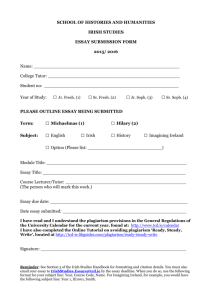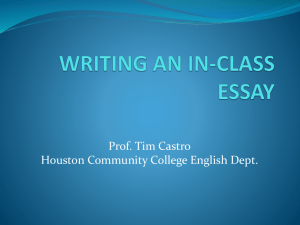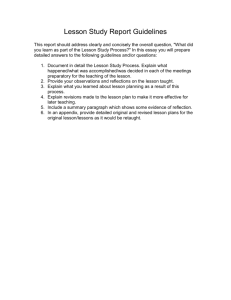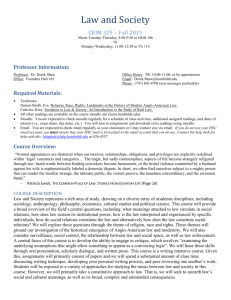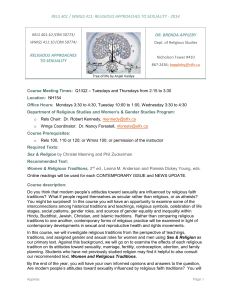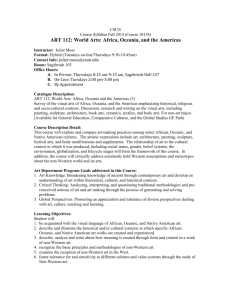RELS 110: An Introduction to World Religions
advertisement
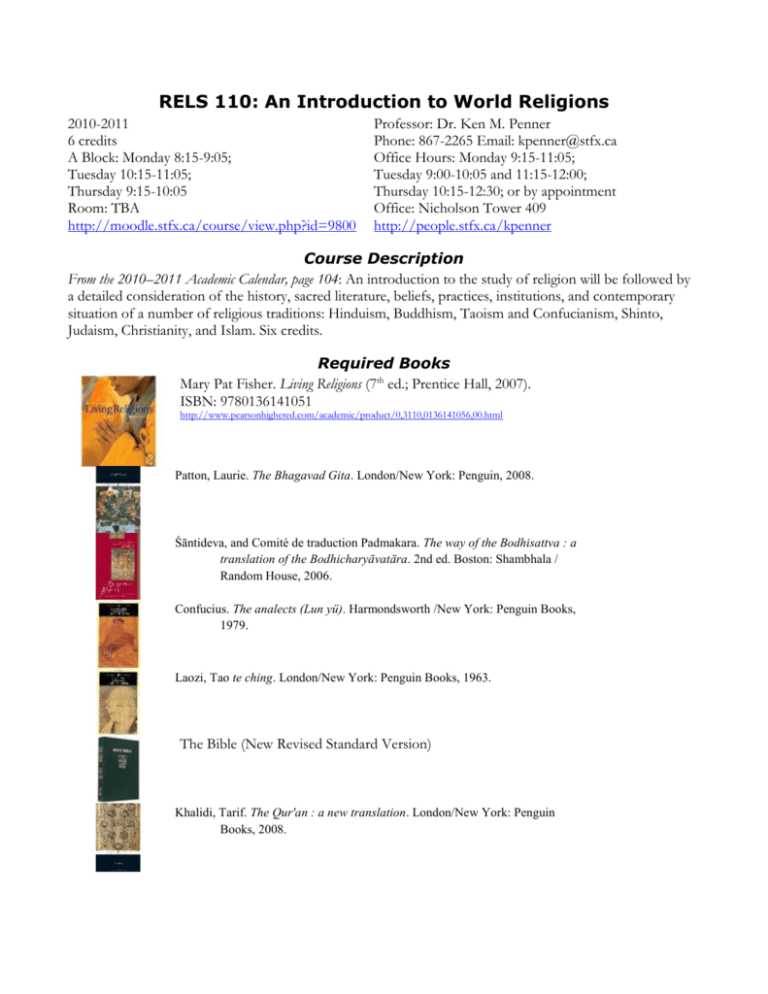
RELS 110: An Introduction to World Religions 2010-2011 6 credits A Block: Monday 8:15-9:05; Tuesday 10:15-11:05; Thursday 9:15-10:05 Room: TBA http://moodle.stfx.ca/course/view.php?id=9800 Professor: Dr. Ken M. Penner Phone: 867-2265 Email: kpenner@stfx.ca Office Hours: Monday 9:15-11:05; Tuesday 9:00-10:05 and 11:15-12:00; Thursday 10:15-12:30; or by appointment Office: Nicholson Tower 409 http://people.stfx.ca/kpenner Course Description From the 2010–2011 Academic Calendar, page 104: An introduction to the study of religion will be followed by a detailed consideration of the history, sacred literature, beliefs, practices, institutions, and contemporary situation of a number of religious traditions: Hinduism, Buddhism, Taoism and Confucianism, Shinto, Judaism, Christianity, and Islam. Six credits. Required Books Mary Pat Fisher. Living Religions (7th ed.; Prentice Hall, 2007). ISBN: 9780136141051 http://www.pearsonhighered.com/academic/product/0,3110,0136141056,00.html Patton, Laurie. The Bhagavad Gita. London/New York: Penguin, 2008. Śāntideva, and Comité de traduction Padmakara. The way of the Bodhisattva : a translation of the Bodhicharyāvatāra. 2nd ed. Boston: Shambhala / Random House, 2006. Confucius. The analects (Lun yü). Harmondsworth /New York: Penguin Books, 1979. Laozi, Tao te ching. London/New York: Penguin Books, 1963. The Bible (New Revised Standard Version) Khalidi, Tarif. The Qur'an : a new translation. London/New York: Penguin Books, 2008. St.FX RELS110:13: Introduction to World Religions 2/4 Requirements The requirements for this course include attendance, weekly online quizzes based on readings, two mid-term tests based on lectures and required reading, two end-of-term exams, a class presentation, and an essay. Lectures This class meets for three hours every week. Attendance at all classes is compulsory and will be recorded. The Academic Calendar, Item 3.7 has strict requirements for class attendance and withdrawal: Students are expected to attend all classes and laboratory periods. Following an absence of more than one class, students should contact each professor or instructor. In the case of sudden emergency requiring an absence of more than five days, students should contact the dean’s office. Faculty are required to report to the dean all unexplained absences in excess of three hours over at least two classes in any term. Lectures will tend to follow a typical pattern: 1. In the Religious Calendar (4 minutes) 2. Religion in the News (4 minutes) 3. Announcements / Administrativa (2 minutes) 4. Student Presentation or discussion of the scripture reading (10 minutes). 5. Explaining a concept (15 minutes) – for the exam’s paragraph answer section. 6. Video with focus questions (14 minutes) and discussion – for the exam’s objective answer section. 7. Homework for Next Time (1 minute) Readings and Online Quizzes Before each class, the student must read the assigned readings carefully, and come to class prepared to discuss what was read. To ensure comprehension of the reading, there will be a quiz on that section of the textbook. In addition to the readings from the textbook, selected readings from the religion’s scriptures will also be indicated in class and on the course Moodle site (http://moodle.stfx.ca/course/view.php?id=9800). These quizzes will be administered online, at the course Moodle site, and are to be completed before the first class of the week. Tests and Examinations There will be a mid-term test each term, on October 19, 2010 and February 17, 2011. Two exams in the exam period will be held, one in December, 2010, and one in April, 2011. See Section 3.9 of the Academic Calendar. The tests and exams will cover material from the readings and class. The questions may include matching, multiple choice, paragraph questions, and a long essay question covering the entire course to date. Refer to the Academic Calendar, Section 3.8 with respect to cheating, plagiarism, and academic dishonesty. Note: Missed tests must be supported by a doctor’s certificate. Examinations must be written during the period listed on the examination schedule. In case of an emergency contact the dean’s office. St.FX RELS110:13: Introduction to World Religions 3/4 Essay The student will write one six-page essay; instructions and possible topics will be distributed in class and on the course Moodle site. Purpose: The purpose of the “Research Essay” is to give the student practice Plagiarism Although academic work often involves research on, or analyzing, evaluating and integrating the reference to, the ideas, data, and critical commentary of other material, to help the student learn to articulate scholars, academic integrity requires that any use of another person’s work be explicitly acknowledged. Plagiarism is the his or her ideas. To accomplish this, the misrepresentation of another’s work-whether ideas or words, student will submit the components of the intellectual or creative works, images or data, published or paper in stages: Proposal, Book Review, unpublished-as one’s own. Examples of plagiarism include: Abstract, Draft, Meeting, Revision. The i. quoting, paraphrasing, or summarizing text, even small professor will give feedback, suggestions, and portions of text, without proper acknowledgement; ii. paraphrasing too closely (e.g., changing only a few words or a grade for the essay and return it within two simply re- arranging the text); and, weeks. Then the student will meet with the iii. downloading from the Web or from a library or any other professor to discuss ways to improve the database all or part of a paper, a journal article, or a book, essay. The student will then have another two or downloading any other website material, excluding weeks to make these improvements and bibliography makers, and presenting it as one’s own work. resubmit the essay for another grade. Format: Turabian or Chicago NotesBibliography style. Plagiarism: The student is responsible for understanding the university’s policy regarding plagiarism, which is summarized in the textbox Length: about 1500 words (i.e., about 6 pages, double-spaced). Steps: 1. 2. 3. 4. 5. 6. Proposal, due November 8, 2010: a. A title page b. A paragraph stating the student’s choice of topic c. A bibliography, including at least one of each of the following: Website, Encyclopedia article, Book or chapter in a book, Journal article. Review (2 pages) of an item from the proposal (or another relevant item), due December 6, 2010: a. Title page b. Summary (1 page) c. Reflection (1 page) d. Bibliography (of that item) Abstract, due January 17, 2011: a. Title page b. The thesis of the paper (what the student will argue) (one paragraph), c. The paper’s structure (how the student will go about demonstrating his or her point) (one paragraph) Draft, due February 14, 2011 a. Title page b. Essay (6 pages) c. Bibliography of all sources used. Meeting, between February 14, 2011 and March 23, 2011: a. Discuss the paper with professor for 10 minutes during professor’s office hours, in professor’s office. Revision due April 6, 2011 a. Revise the Draft, taking into account all feedback from the professor. Submission: Submit the paper electronically on the course Moodle site on or before the following dates: Marking criteria are on the course Moodle site. Note: There will be a deduction of 2% for every day that the essay is late unless a doctor's certificate is provided. St.FX RELS110:13: Introduction to World Religions 4/4 Presentation or Service Learning The student will give a presentation to the class, or alternatively, the student may opt to participate in a service learning experience. Presentation: The student will choose one of the dates from class schedule, to give a presentation on the topic scheduled for that date. The presentation should take between five and ten minutes. The student may choose to write the research paper on the same topic. Service Learning: As an alternative to a presentation, the student may choose to participate in a service learning experience and write a reflective report on it. The “service” involves 20 hours of time in which the student will assist one of the Service Learning Project approved organizations in the local area. The report must include the student’s reflections about the meaning of service based on his or her experience of service and on teachings concerning service found in one of the religious traditions studied during the second term. Length: 4 pages Time Investment and Evaluation Work-load is calculated on the expectation of two (2) hours of work outside of class for every one (1) hour in class. A reading speed of 15 pages per hour is expected. The student should therefore plan to spend eight hours per week on this course: Task Time Grade Class participation (3 hours weekly) Weekly readings (517 textbook pages + 183 pages) (3 hours/week) Online quizzes (15 minutes weekly) Essay (proposal 1%, review 2%, abstract 1%, draft 5%, revision 6%) Tests, including preparation (October, February) Term Exams (including preparation) TOTAL 75 hours 75 hours 6 hours 40 hours 10 hours 20 hours 226 hours 10% 15% 15% 20% 40% 100%




